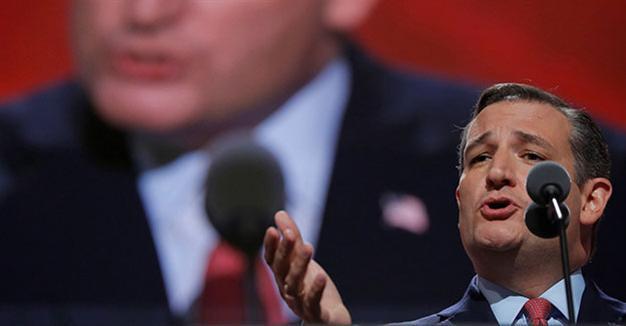Ted Cruz jeered for refusing to back Trump, exposing Republican rift
CLEVELAND

Former Republican U.S. presidential candidate Senator Ted Cruz speaks during the third night of the Republican National Convention in Cleveland, Ohio, U.S. July 20, 2016. REUTERS photo
U.S. Senator Ted Cruz refused to endorse Republican presidential nominee Donald Trump at the party’s convention on July 20, drawing angry jeers from Trump supporters and shattering the facade of party unity that has been carefully built up in Cleveland this week.Anti-Trump Republican delegate Ken Cuccinelli told Reuters he escorted Cruz’s wife, Heidi, off the floor of the Republican National Convention out of concern for her safety following her husband’s speech.
For the third day in a row, what was supposed to be a carefully scripted show of unity was thrown into turmoil by unexpected events that have raised questions about whether the party can unite around Trump to defeat the presumptive Democratic nominee, Hillary Clinton, in the Nov. 8 election.
Cruz, who came in a distant second to Trump in the race for the Republican nomination, stopped short of endorsing Trump after a bitter and personal campaign and mentioned him only once, drawing boos and repeated chants of “We want Trump.”
Cruz began his speech saying: “I want to congratulate Donald Trump on winning the nomination last night,” according to Reuters.
Later in the speech, he urged: “Please, don’t stay home in November. Stand, and speak, and vote your conscience, vote for candidates up and down the ticket who you trust to defend our freedom and to be faithful to the Constitution.”
Some critics saw the appeal for people to vote their conscience as a vote of no-confidence in Trump.
Trump reacted to Cruz’s convention speech, saying the address that drew loud boos was “No big deal!”
Trump said on Twitter that Cruz “didn’t honor” the pledge that Republican primary candidates had made to support the eventual GOP nominee.
Trump said he saw Cruz’s speech two hours early “but let him speak anyway.”
Cruz aides said the Texas senator informed Trump on July 18 that he wouldn’t endorse him, the Associated Press reported.
















